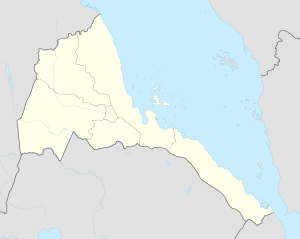Badme
|
Badme ባድመ |
|
|---|---|
| Location in Eritrea (but administered by Ethiopia) | |
| Coordinates: 14°43′34″N 37°48′12″E / 14.72611°N 37.80333°ECoordinates: 14°43′34″N 37°48′12″E / 14.72611°N 37.80333°E | |
| Country |
disputed |
| Region |
|
| Population (2005) | |
| • Total | 1,563 |
Badme is a town in the Horn of Africa and the focus of a territorial dispute between Eritrea and Ethiopia. It is claimed by both Eritrea, which considers Badme to be a part of Gash-Barka Zone, and Ethiopia, which considers Badme part of the Semien Mi'irabawi Zone of the Tigray Region. This dispute was the basis of the Eritrean-Ethiopian War, which began in 1998. Currently the town is occupied by Ethiopia, despite an international court ruling in 2002 that the town fell within Eritrean territory.
The boundaries of Ethiopia and Eritrea follow a frontier defined by the Ethiopian-Italian Treaty of 1902, which ruled Eritrea as a colony at the time. However, the frontier near Badme was poorly defined in the treaty, and since Eritrea became a separate nation in 1993 each nation disputed where the boundary actually runs. The town of Badme was ceded by the TPLF (the predecessor of the EPRDF, Ethiopia's currently ruling party) to the EPLF (the predecessor of the PFDJ, Eritrea's ruling organization) in November 1977.
In 2000, Eritrea and Ethiopia signed the Algiers Agreement which forwarded the border dispute to a Hague boundary commission. In the Agreement both parties agreed in advance to comply with the ruling of the Border Commission. In 2002, the commission ruled on where the boundary ran, placing Badme inside Eritrean territory.
The Sudan Tribune reported that during January 2005, Badme inhabitants were registering to vote in the Ethiopian elections scheduled for May of that year.
Despite initially agreeing to abide by the terms of the Algiers Agreement, Ethiopia refused to withdraw to the border established by the Eritrea-Ethiopia Boundary Commission and rejected its ruling. As a result, thousands of internally displaced people have remained in refugee camps and the threat of renewed war continues.
...
Wikipedia

